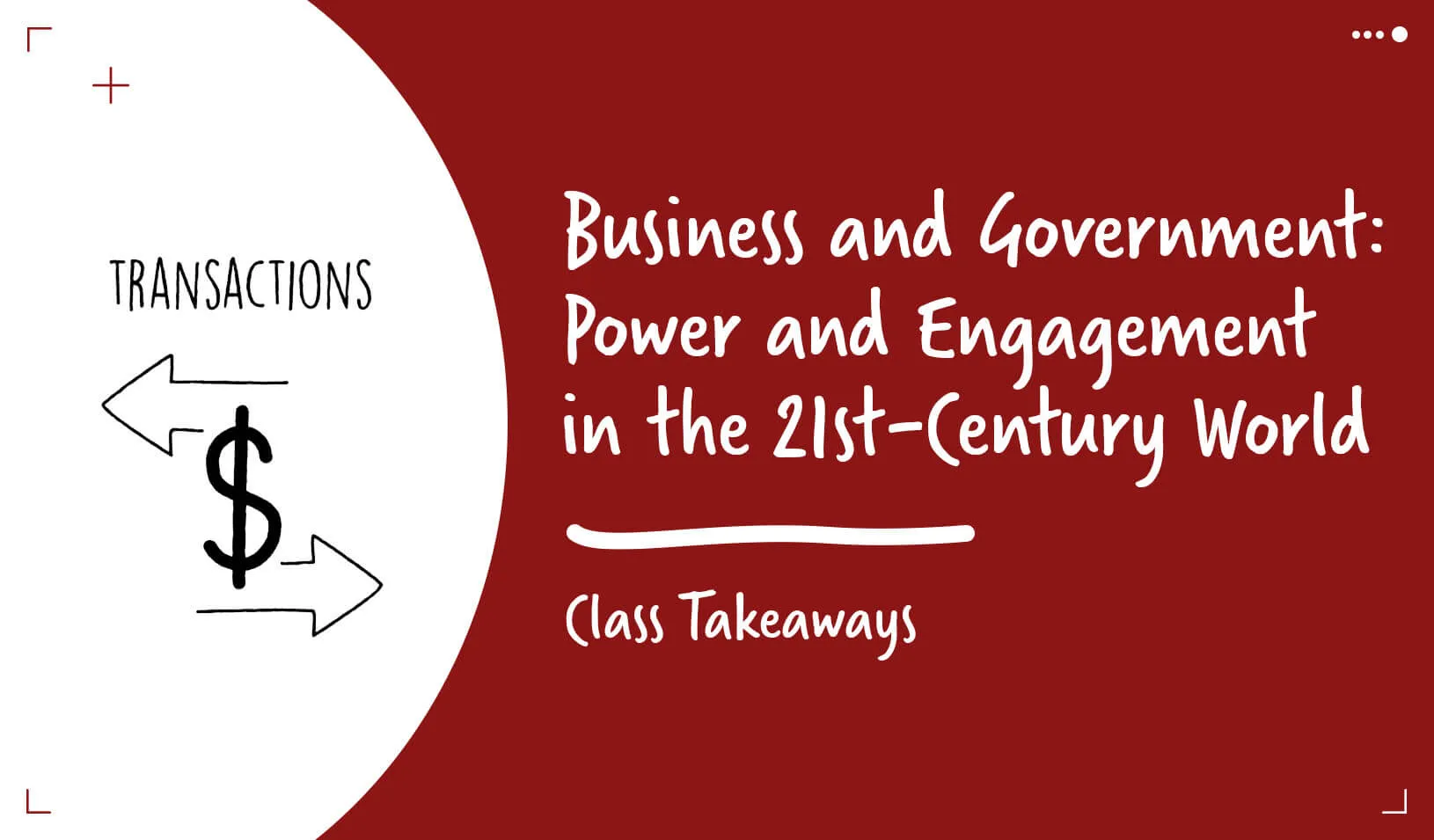October 27, 2022
| by Kelsey DoyleWhen it comes to the corporate world, what do you do if someone breaks a promise to you or doesn’t pay you on time? We often take for granted that markets work well, but, in fact, we need functioning legal systems to ensure they do. And therefore leaders in both government and in business are in a position to make products, and people’s lives, better. But they can also fail them.
In their course, Business and Government: Power and Engagement in the 21st-Century World, professor Anat R. Admati and lecturer Robert E. Siegel discuss the interactions of governments, corporations, and institutions such as media and international organizations to explore the challenges they present for societies around the globe.
Full Transcript
Anat Admati: My name is Anat Admati. I’m a professor of Finance and Economics at the Stanford Graduate School of Business, and I teach interdisciplinary courses.
Robert Siegel: And I’m Rob Siegel, a lecturer in management here at the Stanford Graduate School of Business. I teach a variety of classes here at the school. Today Anat and I are going to talk about our course, Business and Government: Power and Engagement in the 21st Century World.
Anat Admati: Our first point is that markets can’t work well without functioning governments and legal systems. We take a lot for granted around here at Stanford GSB. We think corporations just exist. We think that there are transactions, and there are contracts, and there is competition in markets, all these things, and we don’t stop to think what makes it happen. How is it that all these things come about? What do you do if somebody breaks a promise that they made to you, doesn’t pay you at right time, or prevents you from doing something after you finished working for them because of some non-compete agreement? Where do you go? You need a system to ensure that all these things are working.
Leaders in business and leaders in governments must remember that what they do can protect lives and livelihoods or it can also harm and endanger. We have numerous examples where we love products, and markets work great, and everybody’s doing their bit, and it all works out. In this class we also saw examples where both business leaders and government leaders fail people. For example, we saw a corporation sell the product that became clear was unsafe for children, and yet they don’t inform consumers about it, and they leave the product on the market for a while. Even when they’re recalling, they don’t take very much action to remove it from the market, and the government doesn’t disclose that information very broadly and doesn’t force the corporation to recall more aggressively.
Robert Siegel: Third, we found that leaders need to find and challenge assumptions and wishful thinking, including their own. For example, we saw that assumptions people would make in how they would assume markets work and where markets would fail were not always clear and obvious when people dug down beneath their assumptions. Similarly, we also found that the capabilities and competencies that were assumed of leaders in business and government were not always matched up to what people thought was the world versus what the reality actually held.
Fourth, we found that leaders need to be aware of false choices and misleading labels that prevent us from getting at core issues and understanding what’s really being discussed. For example, words like capitalism and socialism, regulation and laws. What are costly and what are helpful and needed? Even trying to understand things like critical infrastructure. Is it best served by government or is it best served by the private sector? How does it serve the citizens of a particular country or area or nation? This can get in the way of our understanding what are the core issues that we’re trying to address and really understand what are we trying to accomplish as humans and as a society?
Anat Admati: Our fifth point is that effective governance harnesses power, information, and incentives to create trustworthy systems. We talked in this class about institutions, institutions of government, institutions in the private sectors like corporations. In these institutions there are leaders that have power, that have information, and they have discretion or a way to act. Good governance means that they are trustworthy and that they are accountable for what they do. That is the opposite of abuse of power and corruption you might say. Creating trustworthy system means creating institutions that have good governance, and if we do that, then we can thrive as a society.
Robert Siegel: Anat and I bring very different backgrounds, experiences, and training to these important topics. One thing though is very true, Anat and I disagree on everything.
Anat Admati: No Rob, you’re wrong. We don’t disagree on everything. We agree on many things actually.
Robert Siegel: Okay. Eventually, yes, we do end up agreeing on everything.
For media inquiries, visit the Newsroom.






